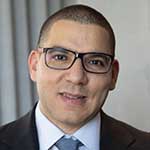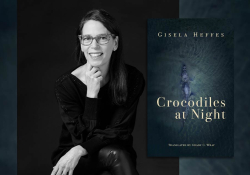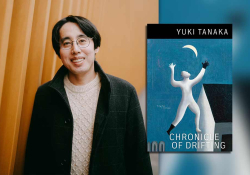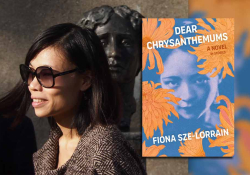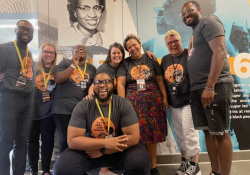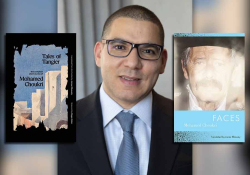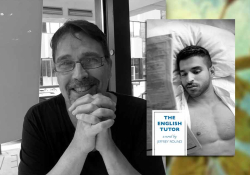Roger Allen: Translating Arabic and the Art of Translation
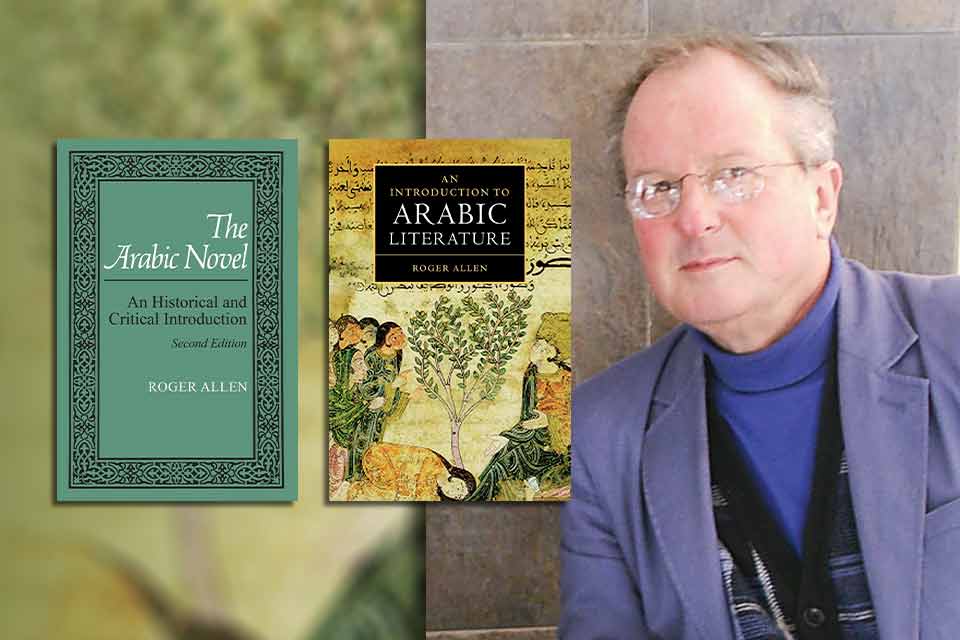 Roger Allen was the first person to obtain a doctorate in modern Arabic literature at the University of Oxford. After obtaining his DPhil, he joined the faculty at the University of Pennsylvania till his retirement, in June 2011, from his position as the Sascha Jane Patterson Harvie Professor of Social Thought and Comparative Ethics in the School of Arts & Sciences. He also served as professor of Arabic and comparative literature in the Department of Near Eastern Languages & Civilizations. He served as president of the Middle East Studies Association of North America (mesa) for the year 2009–10. He is honorary president of the Banipal Trust and subeditor of the Encyclopedia of Islam for modern Arabic literature (3rd ed.). He has contributed to World Literature Today since 1979 (and served on its editorial board for many years), and in 2020 he won the Lifetime Achievement Award of the Shaikh Hamad Award for Translation and International Understanding (Qatar).
Roger Allen was the first person to obtain a doctorate in modern Arabic literature at the University of Oxford. After obtaining his DPhil, he joined the faculty at the University of Pennsylvania till his retirement, in June 2011, from his position as the Sascha Jane Patterson Harvie Professor of Social Thought and Comparative Ethics in the School of Arts & Sciences. He also served as professor of Arabic and comparative literature in the Department of Near Eastern Languages & Civilizations. He served as president of the Middle East Studies Association of North America (mesa) for the year 2009–10. He is honorary president of the Banipal Trust and subeditor of the Encyclopedia of Islam for modern Arabic literature (3rd ed.). He has contributed to World Literature Today since 1979 (and served on its editorial board for many years), and in 2020 he won the Lifetime Achievement Award of the Shaikh Hamad Award for Translation and International Understanding (Qatar).
Among his numerous published studies on Arabic literature are The Arabic Novel: An Historical and Critical Introduction (2nd ed. 1995, 2nd Arabic ed. 1998) and The Arabic Literary Heritage (1998), reprinted in abbreviated paperback form in 2000 as Introduction to Arabic Literature (Arabic ed. 2003).
He has translated a number of fictional works by modern Arab writers, including the Egyptian Nobel laureate, Naguib Mahfouz: a collection of short stories, God’s World (1973), and the novels Autumn Quail, Mirrors, Karnak Café, Khan al-Khalili, and One Hour Left. He has also translated novels and short stories by a number of other Arab authors, including Jabra Ibrahim Jabra, Yusuf Idris, `Abd al-rahman Munif, Mayy Telmissany, Halim Barakat, BenSalim Himmich, Ahmad Toufiq, and Hanan al-Shaykh.
Since retirement, he has published a number of translations: the first complete edition of the original episodes of Muhammad al-Muwaylihi’s Hadith `Isa ibn Hisham (What `Isa ibn Hisham Told Us, 2 vols., 2015); a novel (The Elusive Fox) and short-story collection (Monarch of the Square) by the Moroccan author Muhammad Zifzaf (with Mbarek Sryfi); `Abd al-karim Ghallab’s novel Dafan-na al-madi (We Have Buried the Past, 2018); Naguib Mahfouz’s newly discovered collection of narratives, untitled in the original (The Quarter, 2019); and Ameen Rihani’s travelogue, The Heart of Lebanon (2021). Currently in press are two other historical novels by Reem Bassiouney, Sons of the People (Syracuse University Press) and Al-Qata’i` (Georgetown University Press); and two volumes of Ahmad Toufiq’s autobiography, Father and What He Fathered.
Jonas Elbousty: You received one of the first PhDs in modern Arabic literature from Oxford. What led you to pursue a degree in Arabic literature? What was the discipline like back then?
Roger Allen: Following the tradition of British (private) education, I had been declared a specialist in “classics” (Latin and Greek) by the age of fourteen. Passing all the national exams, I was awarded a place to study classics at Lincoln College, Oxford, in 1961. Having already read much of the classical literature and finding that the Oxford curriculum pursued much the same path, I decided that I needed a change. After a search among many “foreign” languages, I finally settled on Arabic in 1962—without knowing the slightest thing about the language or its culture.
In 1963 I attended a summer course at the British Foreign Office’s Arabic center in Shemlan, Lebanon, and that experience fostered my interest in Arabic culture.
In 1963 I attended a summer course at the British Foreign Office’s Arabic center in Shemlan, Lebanon, and that experience fostered my interest in Arabic culture. In 1963 Dr. M. M. Badawi was appointed the first ever lecturer in modern Arabic literature at Oxford. I took his course on modern Arabic poetry, and . . . that was the end of the beginning. I took the “special exam” on modern Arabic literature for the BA degree in 1965 and, much to my surprise, was awarded a postgraduate fellowship to pursue a doctoral degree. Among the texts that we had read for the BA degree were extracts from Al-Muwaylihi’s Hadith `Isa ibn Hisham, and, with Badawi’s encouragement, I went to Cairo in 1966 to conduct research and prepared my DPhil thesis on the work (and also translated its first part into English, the beginning of that aspect of my career).
Elbousty: What sparked your interest in the Muwaylihi family and their works?
Allen: See the end of my answer to the first question. It was not possible to study one Al-Muwaylihi without studying both, since their lives and careers were so closely linked (and it appears that only fourteen years separated them!). As I continued my research on Muhammad al-Muwaylihi following my immigration to the USA and my appointment at the University of Pennsylvania, I became interested in not only his writings but also those of his father. Both of them had been exiled from Egypt and had spent many years in Europe—Italy, France, and England—before Ibrahim the father was “invited” by Sultan Abd al-Hamid to come to Istanbul. That allowed Muhammad to work in libraries, while his father studied and wrote about the Ottoman administration and its spy system. The book that Ibrahim wrote when he went back to Egypt was immediately banned. Thanks to Bernard Lewis, I obtained a copy of this “banned book” and have now published it in English translation (Spies, Scandals, and Sultans). It was in the 1990s that Gaber Asfour, the famous Egyptian scholar and cultural administrator, asked me to prepare the complete works of both Al-Muwaylihis for publication. They were published in Cairo in 2002 and 2007.
Elbousty: What sparked your interest in translation? Could you tell us about the first text you translated?
Allen: Again, I’ve already referred to my first translation, one of the hardest texts imaginable: Al-Muwaylihi’s Hadith `Isa ibn Hisham. After I started teaching at UPenn in 1968, it became obvious to me that, if I was to teach a course on modern Arabic literature in translation for undergraduates, I would need to do a lot of translation! Thus, I initially translated texts from a variety of genres, but only for classroom use. Gradually however, I began to publish translations, and my encounter with Mahfouz in 1970 was the start of another phase in my career.
Elbousty: Regarding the problematics of translation, can you tell us more about the challenges of translating modern Arabic literature into English?
Allen: The challenges are numerous. Beginning with the source culture, how is one to counter the subdivision of the Arabic-speaking world according to previous patterns of colonialism—the concentration in English on Egypt in particular, of French on the Maghreb, and the late involvement of German scholarship in anything to do with the modern period. With regard to English, there is next the problem of which genre(s) to translate, how, and why? Beyond that, there is the question of the method and purpose of translation itself. To cite Schleiermacher, is it supposed to “domesticate the text” or “foreignize the reader”? I come down firmly on the latter of those two options, believing that there is little point in presenting the reader of translation with something familiar; translations should confront the reader with difference and difficulty. Finally, there is the problem of publication and publicity. For most literary publications in the Western world, Arabic literature is a “fly-over zone.” I cannot recall an occasion over several years now when any of the prominent book reviews in either Britain or the USA have reviewed a work of modern Arabic literature in translation. If anything, the possibility of publishing a translation of a work of modern Arabic literature is now more difficult than it has ever been. Several “series” have either been curtailed or cut completely.
The possibility of publishing a translation of a work of modern Arabic literature is now more difficult than it has ever been.
Elbousty: What is the importance of being in communication with the original author when translating?
Allen: For me, this has been an important issue. With the exception of Al-Muwaylihi (who died in 1930), I have been in close contact with every Arab author whose works I have translated. The most obvious and probably important of those connections was with Naguib Mahfouz, whom I met in Cairo and corresponded with for many years. In 1972 he telephoned me in Cairo to let me know that he was about to publish a series of texts in a new place, the television journal. They were called Al-Maraya, and he encouraged me to read them and translate them into English. I did so, and they appeared as Mirrors, at first without the accompanying portraits by his painter-friend Saif Wanli, and later (in the 1990s) with the portraits included. I had already translated several of his novels (published in the AUC Press series), and, most recently, I was asked to translate the series of short narratives that were discovered in a drawer in his daughter’s apartment in Cairo—The Quarter.
But I have also had wonderful relationships with every single Arab author whose works I have translated. The list is a long one. I could begin with Jabra Ibrahim Jabra, whom I met first in New York—with Adnan Haydar—when we decided to translate Jabra’s The Ship. Subsequently, I had dinner at his house in Baghdad during the Marbid Poetry Festival in 1988 and stayed in touch with him via mail throughout the Iran–Iraq War of the 1980s, sending him cassettes of myself playing the organ and my church choir singing the early church music that he so loved. Our correspondence has in fact been published by the Washington-based journal Jusoor.
It was Jabra who introduced me to `Abd al-rahman Munif, whose Endings I translated and with whom I also maintained a lengthy correspondence while he was writing Mudun al-Milh in its multiple volumes. In fact, he and his wife stayed in our house in Philadelphia while he was doing a tour of the USA.
Hanan al-Shaikh also came to see me in Philadelphia while we were discussing my translation of her Hikayati Sharhun Yatul, which was published in London as The Locust and the Bird.
In Morocco, I met BenSalim Himmich, stayed in his home in Harhoura, and over the years translated four of his novels.
I met Ahmad Toufiq for the first time in Washington, DC, where he had been invited by Halim Barakat. In fact, I mentored his daughter, Maria, who was completing her PhD dissertation on translation by using my translation of her father’s Jarat Abi Musa as her main example. I have now done several joint-sessions with him (especially in his favorite city, Marrakesh), translated some more of his novels (the latest Abu l-Abbas’s Neighbours), and my translation of his two-volume childhood autobiography, Father and What He Fathered, has just been published by Dararab in London.
Elbousty: When you look at Arabic literature and its translation today, what do you see as the biggest hurdles ahead, as well as the gaps that exist, if any?
Allen: I noted above the problem of the concentration by scholars in particularly Western languages on particular subregions within the broader Arabic-speaking world. Within that framework I would suggest that Tunisia, Libya, and Yemen have not done very well. By contrast, there has more recently been a marked interest in the novelistic production of the countries of the Gulf region.
One of the biggest hurdles facing the translation and translators of Arabic literature into English is the general lack of interest among publishers.
One of the biggest hurdles facing the translation and translators of Arabic literature into English is the general lack of interest among publishers. To be sure, there are standouts like Syracuse and Georgetown University Presses and Interlink, but in general the situation, which was never particularly good, is now—it seems to me, at least—worse than ever. That situation raises, of course, the concomitant question of readership. I have referred in the past to an interesting survey done by a French journalist visiting the London Book Fair during a year when modern Arabic literature was a particular focus. He discovered by talking to publishers that the interest in Arabic literature among general readers in Europe varied widely—from considerable interest in France, Spain, and Italy, to extremely minimal interest in Germany and Britain. The American readership was not mentioned, but it is probably similar to that of Britain, if not worse. The primary “market” for translations would seem to be the academic sector and the increasing role of comparative literature studies within that sector.
Elbousty: Have the literary awards dedicated to the translation of Arabic literature increased and encouraged the translation of Arabic literature?
Allen: They have certainly increased what I would term the “visibility” of recent contributions to Arabic fiction, but I am not sure what the practical effects on translation have been. Some of the prizes come with promises of publication of the work in question, but I’m not sure how widespread the phenomenon is.
Elbousty: Outside of the works you have translated, which Arab writers do you enjoy the work of? Which works are your favorite?
Allen: I will confess here that, following my retirement in 2011, I have concentrated entirely on translating specific works into English and not “kept up” with developments in fiction writing and research on it. (The authors I’ve worked on are two: Ahmad Toufiq, whom I’ve already mentioned, and Reem Bassiouney, four of whose historical novels I’ve published in translation, with a fifth in preparation, and a sixth just completed in first draft).
Thus, my selection is somewhat retrospective: Mohammad Barrada, Laila Abu Zaid, Rashid Abu Jadra, Al-Bashir Khurayyif, Ibrahim al-Koni, Yusuf Idris, Tawfiq al-Hakim, Hani al-Rahib, Hanna Mina, and probably others as well . . .
Elbousty: What role would you say you played in Naguib Mahfouz’s fame and eventual winning of the Nobel Prize?
Allen: In the 1980s Salma Jayyusi, the prominent Palestinian poet, critic, and scholar, began a project, called PROTA, to translate modern Arabic literature into English. She immediately asked me to join her in the project as “spokesman.” We published numerous large anthologies with Columbia University Press and others as well. In 1984 Salma was invited to a conference on the poet Adunis in Lund, Sweden, by Sigrid Kahle, a prominent Swedish journalist and critic. While in Sweden, Sigrid took Salma to the Swedish Academy in Stockholm, where she met members of the Nobel Committee and toured the library. She was appalled by the lack of Arabic literary works there. One year later, they told her that the situation had changed; they now had a lot of modern Arabic texts.
In that same year, the Nobel Committee contacted the Oklahoma-based journal, World Literature Today, and asked them to publish a special issue on the Nobel award, concentrating on writers who had been overlooked. The editors in turn contacted Salma, and she in turn contacted me: she would prepare a statement on Adunis, and I would prepare one on Mahfouz. The statements were published and sent to the Nobel Committee in Stockholm. It appears that they were impressed by my essay, in that Mahfouz won the prize in 1988 (one of my translations of his works is mentioned in the Nobel citation).
The Nobel Committee contacted World Literature Today and asked them to publish a special issue on the Nobel award, concentrating on writers who had been overlooked.
Following the award, there was a lot of “talk” about the nomination process, most of which I ignored. A few months later, I received a letter of thanks from the Swedish Academy’s secretary, inviting me to attend the ceremony in December. To my regret, I declined the invitation, having just returned from my 1988 visit to Baghdad (mentioned earlier) and being in the middle of a university semester. However, Salma attended the ceremony. It was in 2004 on a visit to a conference in Cairo that Gamal al-Ghitani took me to Mahfouz’s Tuesday “nadwa” on a houseboat in Doqqi. I had brought my Nobel file with me and showed Gamal the letter from the Nobel Committee thanking me. Ghitani went over to Mahfouz (who by then was substantially deaf) and told him that I had been primarily responsible for his nomination. After a short pause, he said, “I thought so!”
Elbousty: As a final question, can you tell us about your experience with the piano and the organ and how you first came to play these instruments and how they have played a role in your life?
Allen: I grew up in a musical family in Bristol, England; my mother was a ballet dancer. At the age of twelve, I contracted polio and was in hospital, paralyzed, for three months. Piano-playing became part of my recovery routine, and later my teacher, who was also an organist, allowed me to start playing the organ as well. Over the years, playing for churches in Oxford and Cairo (the Anglican Cathedral of All Saints), I developed a kind of parallel career as a keyboard musician, culminating in my appointment in 1974 as organist-choirmaster of the Episcopal church on the UPenn campus, a post I held for twenty-six years (and I’m still substituting occasionally!). Music and playing keyboards have been a major part of my life for decades. I still play my Bechstein grand piano almost every day, trying to keep my fingers in trim as I range from Bach, to Mozart, to Beethoven, to Chopin, to Liszt, to Grieg, and—where feasible—to Rachmaninov!

